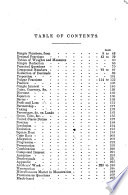 | Almon Ticknor - Arithmetic - 1846 - 276 pages
...16, 8, 4, 2, decrease continually by the divisor 2, &c. In this rule there are five denominations, any three of which being given, the other two may be found : 1st, the first term ; 2d, the last term ; 3d, the number of terms ; 4th, the ratio ; 5th, the sum... | |
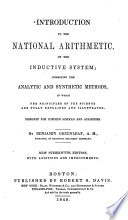 | Benjamin Greenleaf - Arithmetic - 1849 - 336 pages
...descending series ? What are the extremes of a series ? What the means ? What five things are mentioned, any three of which being given, the other two may be found ? 2 6 138 5*4 1&2 486 1458 The factors of 1458, are 3, 3, 3, 3, 3, 3, and 2, the last of which is the... | |
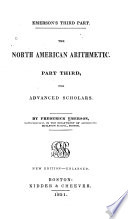 | Frederick Emerson - Arithmetic - 1851 - 342 pages
...What by the common difference ? What is Theorem 1st ? 2d? 3d? 4th? What five things are mentioned, any three of which being given, the other two may be found ? I. The extremes and number of terms being given, how can you find the sum of all the terms ? II.... | |
 | Sarah Porter - Arithmetic - 1852 - 286 pages
...„ L 3. The number of terms ,, N 4. The common difference „ D 5. The sum of all the terms „ S Any three of which being given, the other two may be found. The following, is a summary of all we have already proved by the preceding investigation : — S =... | |
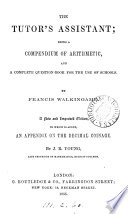 | Francis Walkingame - 1855 - 186 pages
...last term I. 3. The number of terms те. 4. The equal difference d. 5. The sum of all the terms S. Any three of which being given, the other two may be found. The first, second, and third of the above five things given, to find the fifih. RULE. Multiply the... | |
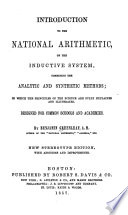 | Benjamin Greenleaf - Arithmetic - 1857 - 336 pages
...descending series ? What are the extremes of a series ? What the means ? What five things aro mentioned, any three of which being given, the other two may be found ? I 2 6 18 54 162 486 1458 The factors of 1458 are 3, 3, 3, 3, 3, 3, and 2, the last of which is the... | |
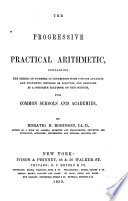 | Horatio Nelson Robinson - Arithmetic - 1859 - 348 pages
...the difference between any two adjacent terms. 437. There are Jive parts in an arithmetical series, any three of which being given, the other two may be found. They are as follows : the first term, last term, common difference, number of terms, and sum of all... | |
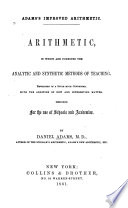 | Daniel Adams - Arithmetic - 1861 - 452 pages
...extremes, and the other terms are called the means. There are five things in an arithmetical progression, any three of which being given, the other two may be found : 1st. Theirs* term. 2d. The last term. 3d. The number of terms. 4th. The common difference. 5th. The... | |
 | George Augustus Walton - Arithmetic - 1864 - 364 pages
...12, &c. If the numbers decrease from the first term, the series if a Decreasing Series; eg, 13, 11, 9, 7, 5, &c. 487. In every series, five things are...the student is referred to works on Algebra. NOTE II. — Increasing series only will be considered in this book, as rules that apply to increasing series... | |
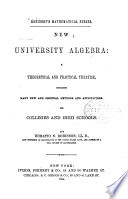 | Horatio Nelson Robinson - Algebra - 1864 - 444 pages
...APPLICATION OF THE FOKMULAS. 364. The two primitive equations, contain the five quantities, a, r, l, n, S, any three of which being ~given, the other two may be found; for, by substitution of the given values, the result will always be two equations involving but two... | |
| |